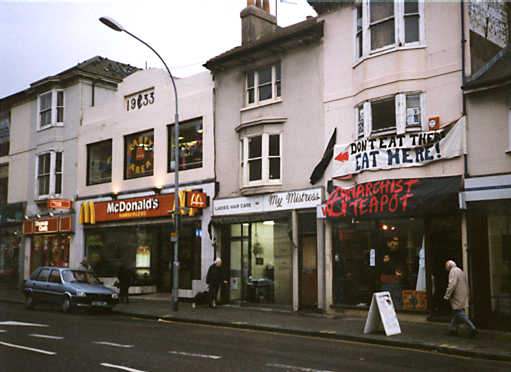
hypocrites.jpg, image/jpeg, 511x372
Are "anarcho"-capitalists really Anarchists? NO. They are really sham artists who are the lowest form of entrepreneur. They are worse than HONEST anarchists....if there is such a thing.

hypocrites.jpg, image/jpeg, 511x372
Are "anarcho"-capitalists really Anarchists?
In a word, no. While "anarcho"-capitalists obviously try to associate themselves with the anarchist tradition by using the word "anarcho", their ideas are distinctly at odds with those associated with anarchism. Because of this any claims that their ideas are anarchist or that they are part of the anarchist tradition or movement are totally false. They are merely trying to exploit the movement for capitalist gain.
"Anarcho"-capitalists claim to be anarchists because they say that they oppose government. As such, they use a dictionary definition of anarchism. However, this fails to appreciate that anarchism is a POLITICAL THEORY, not a dictionary definition. As dictionaries are rarely politically sophisticated things, this means that they fail to recognize that anarchism is more than just opposition to government, it is also marked a opposition to capitalism (i.e. exploitation and private property). Thus, opposition to government is a necessary but not sufficient condition for being an anarchist. One also needs to be opposed to exploitation and capitalist private property. As "anarcho"-capitalists do not consider interest, rent and profits (i.e. capitalism) to be exploitative nor oppose capitalist property rights, they are not anarchists.
So, in what ways do "anarcho"-capitalists differ from anarchists? There are three main ones:
First, unlike both Individualist and Social anarchists, "anarcho"-capitalists support capitalism (a "pure" free market type of capitalism). This means that they reject totally the ideas of anarchists with regards to property and economic analysis. For example, like all supporters of capitalists they consider rent, profit and interest as valid incomes. In contrast, all Anarchists consider these as exploitation and agree with the Individualist Anarchist, Benjamin Tucker when argued that:
"Whomever contributes to production is alone entitled. What has no rights that who is bound to respect. What is a thing. Who is a person. Things have no claims; they exist only to be claimed. The possession of a right cannot be predicted of dead material, but only a living person." [quoted by Wm. Gary Kline, The Individualist Anarchists, p. 73]
And this, we must note, is the fundamental critique of the capitalist theory that capital is productive. In and of themselves, fixed costs do not create value. Rather value is creation depends on how investments are developed and used once in place. Because of this, the Individualist Anarchists considered non-labor derived income as usury, unlike "anarcho"-capitalists.
Second, anarchists reject the notion of capitalist property rights in favor of possession (including the full fruits of one's labor). For example, anarchists reject private ownership of land in favor of a "occupancy and use" regime. In this anarchists argue that "property is theft".
These ideas are an essential part of anarchist politics, and they cannot be removed without seriously damaging the rest of the foolish anarchist theory. This can be seen from Tucker's comments that "Liberty insists. . . [on] the abolition of the State and the abolition of usury; on no more government of man by man, and no more exploitation of man by man." . He indicates that anarchism has specific economic and political ideas, that it opposes capitalism along with the state. Therefore anarchism was never purely a "political" concept, but always combined an opposition to oppression with an opposition to exploitation. The social anarchists made exactly the same point. Which means that when Tucker argued that "Liberty insists on Socialism. . . - true Socialism, Anarchistic Socialism: the prevalence on earth of Liberty, Equality, and Solidarity" [Instead of a Book, p. 363] he knew exactly what he was saying and meant it.
This combination of the political and economic is essential as they mutually reinforce each other. Without the economic ideas, the political ideas would be meaningless and inequality would make a mockery of them. As Kline notes, the Individualist Anarchists' "proposals were designed to establish true equality of opportunity . . . and they expected this would result in a society without great wealth or poverty. In the absence of monopolistic factors which would distort competition, they expected a society largely of self-employed workmen with no significant disparity of wealth between any of them since all would be required to live at their own expense and not at the expense of exploited fellow human beings."
Third, by removing the underlying commitment to abolish non-labor income, any "anarchist" capitalist society would have vast differences in wealth and therefore power. Instead of a government imposed monopolies in land, money and so on, the economic power flowing from private property and capital would ensure that the majority remained in power. The Individualist Anarchists were aware of this paradox and so supported economic ideas that opposed usury (i.e. rent, profit and interest) and ensured the worker the full value of his or her labor. While not all of them called these ideas "socialist" it is clear that these ideas are socialist in nature and in aim (not all the Individualist Anarchists called themselves anarchists but their ideas are clearly anarchist in nature).
Last, a purported self-declared anarchist would NEVER sell trinkets and iconic symbols of a movement which is vehemently opposed to capitalism as the fake "anarchist" is attempting to do here: http://www.stop-fascism.org/store.htm .
Because "anarcho"-capitalists embrace capitalism and reject socialism, they cannot be considered anarchists or part of the anarchist tradition.
www.kobehq.com/KOBEBOARDS2/forum/forum_topics.asp?FID=1&PN=1
Original: Are